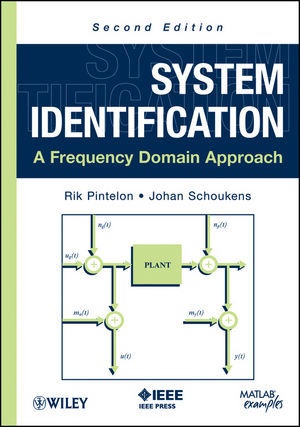Read more
Informationen zum Autor RIK PINTELON, PhD, serves as a full-time professor at the Vrije Universiteit Brussel in the ELEC Department. He has been a Fellow of IEEE since 1998 and is the recipient of the 2012 IEEE Joseph F. Keithley Award in Instrumentation and Measurement (IEEE Technical Field Award). JOHAN SCHOUKENS, PhD, serves as a full-time professor in the ELEC Department at the Vrije Universiteit Brussel. He has been a Fellow of IEEE since 1997 and was the recipient of the 2003 IEEE Instrumentation and Measurement Society Distinguished Service Award. Klappentext System identification is a general term used to describe mathematical tools and algorithms that build dynamical models from measured data. Used for prediction, control, physical interpretation, and the designing of any electrical systems, they are vital in the fields of electrical, mechanical, civil, and chemical engineering.Focusing mainly on frequency domain techniques, System Identification: A Frequency Domain Approach, Second Edition also studies in detail the similarities and differences with the classical time domain approach. It high??lights many of the important steps in the identification process, points out the possible pitfalls to the reader, and illustrates the powerful tools that are available.Readers of this Second Editon will benefit from:* MATLAB(r) software support for identifying multivariable systems that is freely available at the website http://booksupport.wiley.com* State-of-the-art system identification methods for both time and frequency domain data* New chapters on non-parametric and parametric transfer function modeling using (non-)period excitations* Numerous examples and figures that facilitate the learning process* A simple writing style that allows the reader to learn more about the theo??retical aspects of the proofs and algorithmsUnlike other books in this field, System Identification, Second Edition is ideal for practicing engineers, scientists, researchers, and both master's and PhD students in electrical, mechanical, civil, and chemical engineering. Zusammenfassung System identification is a general term used to describe mathematical tools and algorithms that build dynamical models from measured data. Used for prediction, control, physical interpretation, and the designing of any electrical systems, they are vital in the fields of electrical, mechanical, civil, and chemical engineering. Inhaltsverzeichnis Preface to the First Edition Preface to the Second Edition Acknowledgments List of Operators and Notational Conventions List of Symbols List of Abbreviations Chapter 1 An Introduction to Identification Chapter 2 Measurement of Frequency Response Functions - Standard Solutions Chapter 3 Frequency Response Function Measurements in the Presence of Nonlinear Distortions Chapter 4 Detection, Quantification, and Qualification of Nonlinear Distortions in FRF Measurements Chapter 5 Design of Excitation Signals Chapter 6 Models of Linear Time-Invariant Systems Chapter 7 Measurement of Frequency Response Functions - The Local Polynomial Approach Chapter 8 An Intuitive Introduction to Frequency Domain Identification Chapter 9 Estimation with Know Noise Model Chapter 10 Estimation with Unknown Noise Model - Standard Solutions Chapter 11 Model Selection and Validation Chapter 12 Estimation with Unknown Noise Model - The Local Polynomial Approach Chapter 13 Basic Choices in System Identification Chapter 14 Guidelines for the User Chapter 15 Some Linear Algebra Fundamentals Chapter 16 Some Probability and Stochastic Convergence Fundamentals Chapter 17 Properties of Least Squares Estimators with Deterministic Weighting Chapter 18 Properties of Least Squares Estimators with Stochastic Weighting
List of contents
Preface to the First Edition
Preface to the Second Edition
Acknowledgments
List of Operators and Notational Conventions
List of Symbols
List of Abbreviations
Chapter 1 An Introduction to Identification
Chapter 2 Measurement of Frequency Response Functions - Standard Solutions
Chapter 3 Frequency Response Function Measurements in the Presence of Nonlinear Distortions
Chapter 4 Detection, Quantification, and Qualification of Nonlinear Distortions in FRF Measurements
Chapter 5 Design of Excitation Signals
Chapter 6 Models of Linear Time-Invariant Systems
Chapter 7 Measurement of Frequency Response Functions - The Local Polynomial Approach
Chapter 8 An Intuitive Introduction to Frequency Domain Identification
Chapter 9 Estimation with Know Noise Model
Chapter 10 Estimation with Unknown Noise Model - Standard Solutions
Chapter 11 Model Selection and Validation
Chapter 12 Estimation with Unknown Noise Model - The Local Polynomial Approach
Chapter 13 Basic Choices in System Identification
Chapter 14 Guidelines for the User
Chapter 15 Some Linear Algebra Fundamentals
Chapter 16 Some Probability and Stochastic Convergence Fundamentals
Chapter 17 Properties of Least Squares Estimators with Deterministic Weighting
Chapter 18 Properties of Least Squares Estimators with Stochastic Weighting
Chapter 19 Identification of Semilinear Models
Chapter 20 Identification of Invariants of (Over) Parameterized Models
References
Subject Index
Author Index
About the Authors

